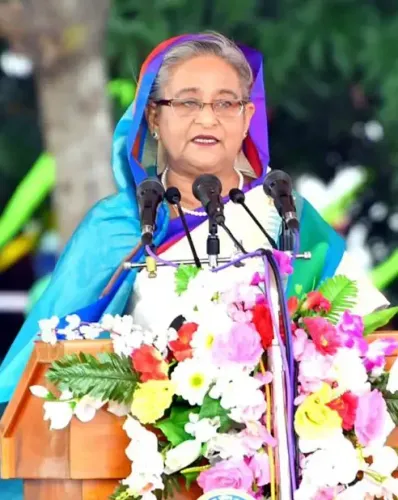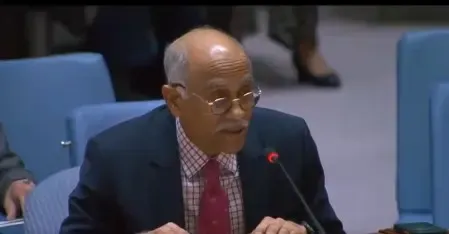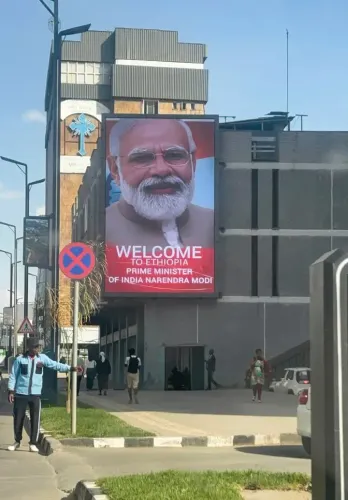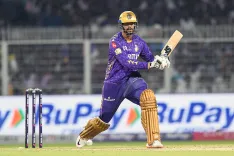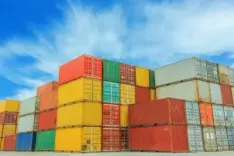Italy Acknowledges India's Role as a Central Hub in the Mediterranean and Indian Ocean

Synopsis
Key Takeaways
- Italy recognizes India’s strategic importance in global trade.
- Strengthening transatlantic partnerships is vital for Italy.
- The India-Middle East-Europe Economic Corridor is a key initiative.
- Italy and India are enhancing cooperation in various sectors.
- Cultural ties between Italy and India are being actively promoted.
President Donald Trump's trade diplomacy is set to drastically transform globalization and trade practices for the first time since World War II. No entities have been exempt from this shift; friends, allies, adversaries, and competitors have all experienced its effects to varying extents as a significant global reset approaches. The White House has commenced only a limited number of serious negotiations thus far, focusing on Vietnam, India, South Korea, and Japan, prioritizing current trade partners that are crucial for countering China.
Europe is facing its own challenges amid a war nearby, an unpredictable White House, and significant uncertainty regarding NATO’s future. In this context, Italian Prime Minister Giorgia Meloni is preparing for a visit to the US on April 17th. Known as the “Trump whisperer,” Meloni is expected to negotiate a plan that is acceptable for both Europe and Italy. She firmly believes that it is in both Italy’s and Europe’s best interests to sustain and enhance the transatlantic partnership, which has been a cornerstone of Europe’s foreign policy since World War II.
While many European leaders, even those who do not support Meloni, hope she will return with a viable agreement, some, like Spanish Prime Minister Pedro Sánchez, have opted to visit China to appease Xi Jinping, only to be invited to join efforts against “tariff bullying.” Interestingly, the only nation unaffected by Trump’s tariffs is Russia, which is already under severe sanctions. Trump aims to finalize a deal with Russia that would not only halt the latter’s aggression in Ukraine but also secure its cooperation in achieving a resolution in the Middle East. In the midst of this tariff conflict, Trump has initiated indirect negotiations with Iran in Oman and is engaged in active diplomatic discussions with Russia to negotiate a ceasefire.
As Meloni readies for her White House visit, marking her first since attending Trump’s inauguration, Italy’s Deputy Prime Minister and Minister of Foreign Affairs, Antonio Tajani, visited Delhi on April 11-12. Tajani is also expected to travel to Japan for the inauguration of Italy’s Pavilion at Expo Osaka. While Meloni focuses on strengthening the transatlantic alliance, Tajani is working to solidify ties with India and Japan, two vital allies that are integral to Italy’s Indo-Mediterranean and Indo-Pacific strategic framework. In 2021, Italy, India, and Japan initiated a trilateral partnership aimed at fostering security and economic stability in the Indo-Pacific.
Tajani’s visit to Delhi was highly successful, including a meeting with President Droupadi Murmu, an honor typically reserved for heads of state, highlighting the significance India places on its relationship with Italy.
The bilateral visit involved the India-Italy Business, Science and Technology Forum, where over 400 companies gathered under the leadership of Ministers Tajani, S. Jaishankar, Piyush Goyal, and Anna Maria Bernini to emphasize collaboration in Industry 4.0, innovation, cleantech, and infrastructure. Italy announced the establishment of an innovation hub at its consulate in Bangalore, along with a space attaché who will join the Embassy in Delhi. Tajani was accompanied by Anna Maria Bernini, Italy’s Minister of Education, signaling a new phase in educational and research cooperation, including the mutual recognition of academic credentials and the promotion of joint research initiatives.
Beyond trade and innovation, Italy’s new Ambassador to India, Antonio Bartoli, also emphasized people-to-people, cultural, and sports diplomacy. Ministers Tajani and Jaishankar visited a Caravaggio painting at the Italian Cultural Centre, and an exhibition of Roman mosaics and Italian textiles was inaugurated during the visit. The historical connections between Rome and India are not merely discussed but actively showcased, as evidenced by an exhibition earlier in March in Delhi that highlighted Italy’s ancient wine culture.
While Tajani announced a reciprocal trade summit in Brescia, the most notable announcement was likely the upcoming India-Middle East-Europe Economic Corridor (IMEC) summit in Trieste during the latter half of 2025. Italy was among the original signatories of IMEC at the G20 summit in New Delhi but has since lagged in its commitments. With the recent appointment of veteran diplomat Francesco Maria Talò as its special envoy, this summit is set to convene ministers from all IMEC countries (US, India, Israel, Italy, UAE, Saudi Arabia, France, Germany, and the EU) in Trieste, a strategic location for connecting with Europe’s industrial core. Ambassador Talò previously served as the diplomatic advisor to Prime Minister Meloni during her visit to India for the G20, further underscoring Italy’s commitment to the IMEC initiative.
IMEC is crucial for Europe now, as India’s role as a connector with ASEAN nations becomes increasingly significant. The recent Bay of Bengal Initiative for Multi-Sectoral Technical and Economic Cooperation (BIMSTEC) summit reveals the immense potential for India to emerge as a trade hub linking Europe, the Middle East, Bay of Bengal, and ASEAN. IMEC to the west, alongside new trade routes to the east under the BIMSTEC framework, aims to create stability, ensure protection, and shorten trade routes for like-minded partners.
Tajani’s visit has reinforced the notion that the Meloni government endorses India’s ascent as a crucial nexus of maritime routes in both the Indo-Mediterranean and the Indo-Pacific, establishing it as a pivotal hub for trade and leadership within the global south. Italy regards India as a genuine ally, and the “Meloni” partnership is destined to endure.
Reflecting its ethos of Vasudhaiva Kutumbakam, India should consider reducing duties and tariffs on select goods as a gesture of goodwill towards Italy and Europe during this turbulent geopolitical period. In an era marked by “the only certainty being uncertainty,” India could serve as that certainty, acting as a guiding lighthouse for its allies to navigate safely.
(The author is the Chief Representative for Italy of the Indian Chamber of Commerce, an Italian entrepreneur, and journalist of Indian heritage, and the founder of the Indo-Mediterranean Initiative (cnky.in).
(The opinions expressed herein are solely those of the author and do not necessarily reflect the views of IANS.)


